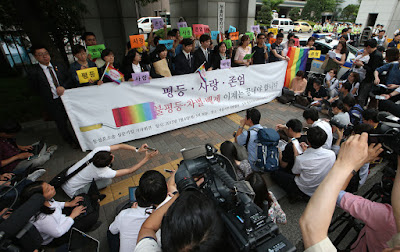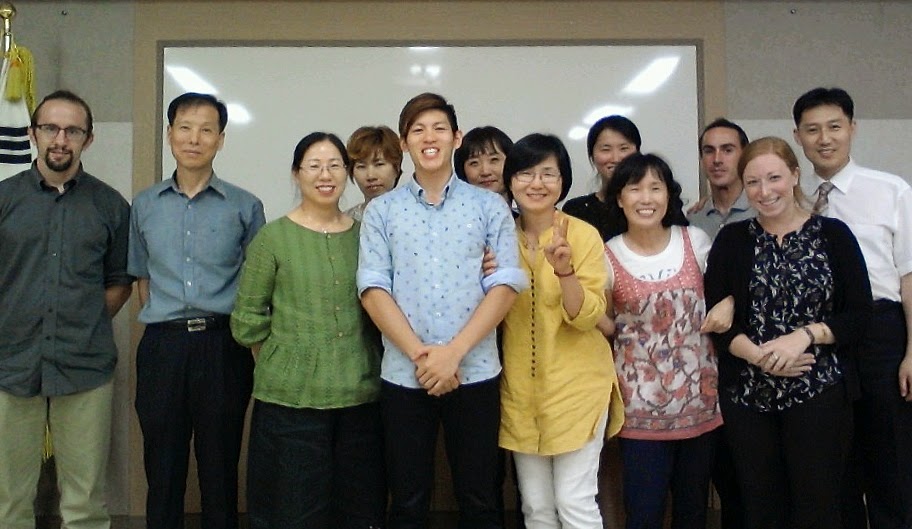 |
| "In a world where I can be myself, all love is equal." |

This year's Korea Queer Culture Festival had its opening ceremony on June 9th and its closing parade on June 28th. I went to both events and took photos to share with you all.
(I have translated this post into Korean. But I have not had it checked at all, so it's going to be messy. Sorry in advance for the errors!)
올해 한국의 퀴어문화축제는 6월9일에 개막식이 열리고 6월 28일 자긍심 (프라이드) 퍼레이드가 열렸다. 저는 사진을 찍어려 갔다.
(저는 한국어를 잘 못 해서 실수가 많이 있르 것이다. 미안합니다!)
To my Christian friends: a good number of you may be against events like Pride and the values that it stands for. I understand this. Years ago I also used my religion and my deeply-held beliefs about Biblical morality to fuel my disapproval of all things that had to do with LGBTQ expression.
저의 기독교인 친구들에게: 아마 너희들중에 이런 행사와 성소수자의 이상에 반대하는 사람이 많은 것 같다. 저는 너희들의 생각을 이해한다. 저도 이전에 기독교와 성경을 믿기 때문에 동성애와 다른 성소수자의 표현을 싫어했다.
My point of view has changed, however. I believe now that it is only fair that LGBTQ people have the same rights as everyone else: the right to celebrate their own culture, the right to get married, the right to create families and contribute to society without being condemned or threatened because of their differences in gender or sexuality.
하지만 이제 저는 생각을 바꿨다. 지금 성소수자들이 평등권리를 받야 한다고 생각한다. 퀴어 문화를 즐기는 권리며, 결혼 권리며, 가족을 이루는 권리며, 혐오나 협박 없이 사회에 공헌할 수 있는 권리도 필요한다.

Furthermore, I believe that the Christians who have historically opposed LGBTQ activism have done so in a largely unloving and foolish way. While Christ calls us to love even our enemies, Christians were the first to cast stones at the oppressed sexual minority communities, or else stood by and watched discrimination become entrenched in society without lifting a finger to help. Christians should have been the first to help an oppressed minority, because God's love transcends petty human ideologies.
또 한, 이전에 성소수자의 활동주의에 반대하는 기독교인들은 야박하고 어리석게 했다고 생각한다. 예수님이 우리가 원수를 사랑하라고 했지만, 억압당하는 성소수자들을 공격하는 사람들이 기독교인들이었다. 선소수자들이 사외에서 차별을 당할 때 손가락도 까딱하지 않은 사람들이 기독교인들이었다. 오히려 기독교인들은 먼저 도와줘야 했었는데요. 왜냐하면 하나님의 사랑이 인간의 이상들을 초월하기 때문이다.
 |
| Seoul Pride Parade 2015 |
So here I was at Seoul's Pride Month events, happy to see Korea's LGBTQ community come together in strength and solidarity, and at the same time dismayed (yet unsurprised) to see huge numbers of conservative Christian protestors loudly declaiming against homosexuality, AIDS, public indecency, and gay marriage. They flew the Korean flag and a cross flag to symbolize the ideals of faith and tradition that drove them to protest, and they countered all of the Pride events with rallies and performances of their own.
그런데 제가 퀴어문화 축제를 다녔는데, 한국 성소수자들이 같이 모이는 것 하고 그들의 공동체의 결속을 보여줘서 고무적이고 감동적이었다. 반면에 수 많은 보수적인 기독교의 시위자들이 ‘동성애 아웃’, ‘에이즈의 광란’, ‘동성결혼 싫어’, ‘외설죄 반대’라는 구호를 시끄럽게 소리치는 것도 봐서 조금 속상했다. (역시 보수적인 기독교의 시위자들…) 신앙과 전통의 상진주의 위해 태극기와 기독교의 십자가 국기를 올렸고 퀴어문화축제에 반대의 그들은 자기의 행사를 열렸다.

I just want to show you what it looked like from the perspective of a non-Korean, Christian, gay man. I went to enjoy the events, and I went with friends, and I never at any point felt unsafe. I was happy to see the joy and pride at KQCF. I hope that the Christians who support LGBTQ rights will be encouraged that even in a conservative country like Korea, a celebration like this can happen. I also hope that the Christians who do not support LGBTQ rights will see despite their opposition, the right way to win hearts is not through anger, disgust, or despair, but through love.
저는 그냥 직접 목격한 것을 좀 보여드리고 싶다. 저는 한국인 아니며, 예수님을 사랑하는 게이 남성인데 올해 퀴어문화축제에 즐겁게 지내려고 갔다. 친구들이랑 무사히 다녀왔다. 제가 KQCF에서 행복한 분위기와 모든 사람들의 자긍심이 보일 수 있어서 기뻤다. 여러분, 성소수자를 지지하는 기독교인들이 한국과 같은 보수적인 나라에서도 이런 축제가 열려도 되는것에서 위안을 찾으시면 좋겠다. 그리고 성소수자의 권리에 반대 하는 기독교인들이 다음 진상을 아시면 좋겠다: 남의 마음을 얻는 것을 위해서 가장 좋은 방식이 분노, 혐오, 절망으로 아니고 사랑으로 해야한다.
 |
| Dance performances at KQCF 2015 |

To my Korean friends: a good number of you may be curious about what KQCF is, even though it has been held annually in Seoul for sixteen years now. Here's my short explanation: Some people think homosexuality is something that recently came from Western societies into Korea. Actually, LGBTQ (lesbian, gay, bisexual, transgender, and queer) people have been in Korea for hundreds of years, but the recognition that sexual minorities are normal and not mentally ill or perverted is more recent. And even more recently, there have been movements around the world to show acceptance of these sexual minorities.
저의 한국친구들에게: 아마 너희들중에 ‘퀴어문화축제’가 뭣인지 궁굼할 것 같다. 한국에서 지난 16년 동안 열렸거든요… 어쨌든. 동성애가 서양 사회에서 한국에 들어온 것이라고 생각하는 사람도 있다. 사실은 LGBTQ (레즈비언, 게이, 양성애, 트랜즈젠더, 퀴어 등) 사람들이 한국에 옛날부터 있었지만, 이 성소수자들이 실제로 정신 장애가 없고 변태가 아니라는 인식이 현대까지 안 나왔다. 그리고 더 최근에 전세계에 성소수자의 승인을 구하는 운동들이 시작되었다.
Seoul's "Korea Queer Culture Festival" began in the year 2000. LGBTQ activists have had to fight to gain recognition that LGBTQ people even exist in Korea. But there are more hurdles to overcome. Discrimination against LGBTQ people is widespread: in Korea, a gay or lesbian couple cannot get married, a person can be fired from their job for being queer, and, of course, LGBTQ teenagers can be bullied to the point of wanting to commit suicide. Activists and allies in Korea want to change laws and public opinion in Korea so that Korean society will become a safer place for sexual minorities.
서울의 ‘퀴어문화축제’라는 행사는 2000년에 세웠다. 이 전에 한국의 성소수자들의 존재를 대채로 인식되지 않았다. 요즘은 퀴어 사람들이 옛잘 보다 자주 보일 수 있지만 성소수자에 관한 사회의 문제가 많이 남았다고 생각 한다. 성소수자에 대한 차별이 정말 많다. 예를 들면 한국에서 게이나 레즈비언 커플의 결혼은 불법이다. 그리고 어떤 성소수자가 성적 성향 때문에 일에서 해고될 수 있다. 또, 퀴어 청소년들이 자주 자살하도록 괴롭힘을 당하고 있다. 한국 성소수자 운동가들 하고 동맹자(친구)들은 한국이 성소수자에게 안전한 사회가 되도록 한국의 법을 개정하고 여론을 바꾸고 싶다.
Of course, KQCF is also a big party, too. LGBTQ people value freedom, love, and equality for all people regardless of who they are. The reason the celebration can be a little bit wild is probably a direct response to the intensity of the community's historical oppression. If you go to a Pride event and see crazy costumes, leftist slogans, or people behaving in a way that is surprising to you, I encourage you to remain open-minded and remember that there is a reason for all of the things people do and believe, and that it is better to try to appreciate that reason than to immediately dismiss it because you don't understand.
물론 퀴어문화축제는 축제이잖아요. 성소수자들은 사람들의 차이에 상관없이 자유, 사랑과 평등을 소중하게 생각한다. 축제가 가끔… 광란(격렬?)하는 이유는 성소수자들의 역사상의 억압에 직접 반응인 것 같다. 너희들이 프라이드 행사에 다니시고 괴짜의 의상, 좌파 구호나 이상한 사람을 보시면, 므음을 열기를 바랍니다. 인간행동과 우리의 믿음이 개인에 딸라 다른 것을 잊지 마세요. 남의 다른 자가표현을 알아듣지 않아서 싫어하지 말고 그들을 이해해보시기 바랍니다.
To my LGBTQ friends: Have courage, and happy Pride!
우리 게이, 레즈비언, 양성애의, 트랜즈젠더, 퀴어 등 친구들에게: 용기를 가지세요. 힘내. 화이팅. 해피 프라이드!



















